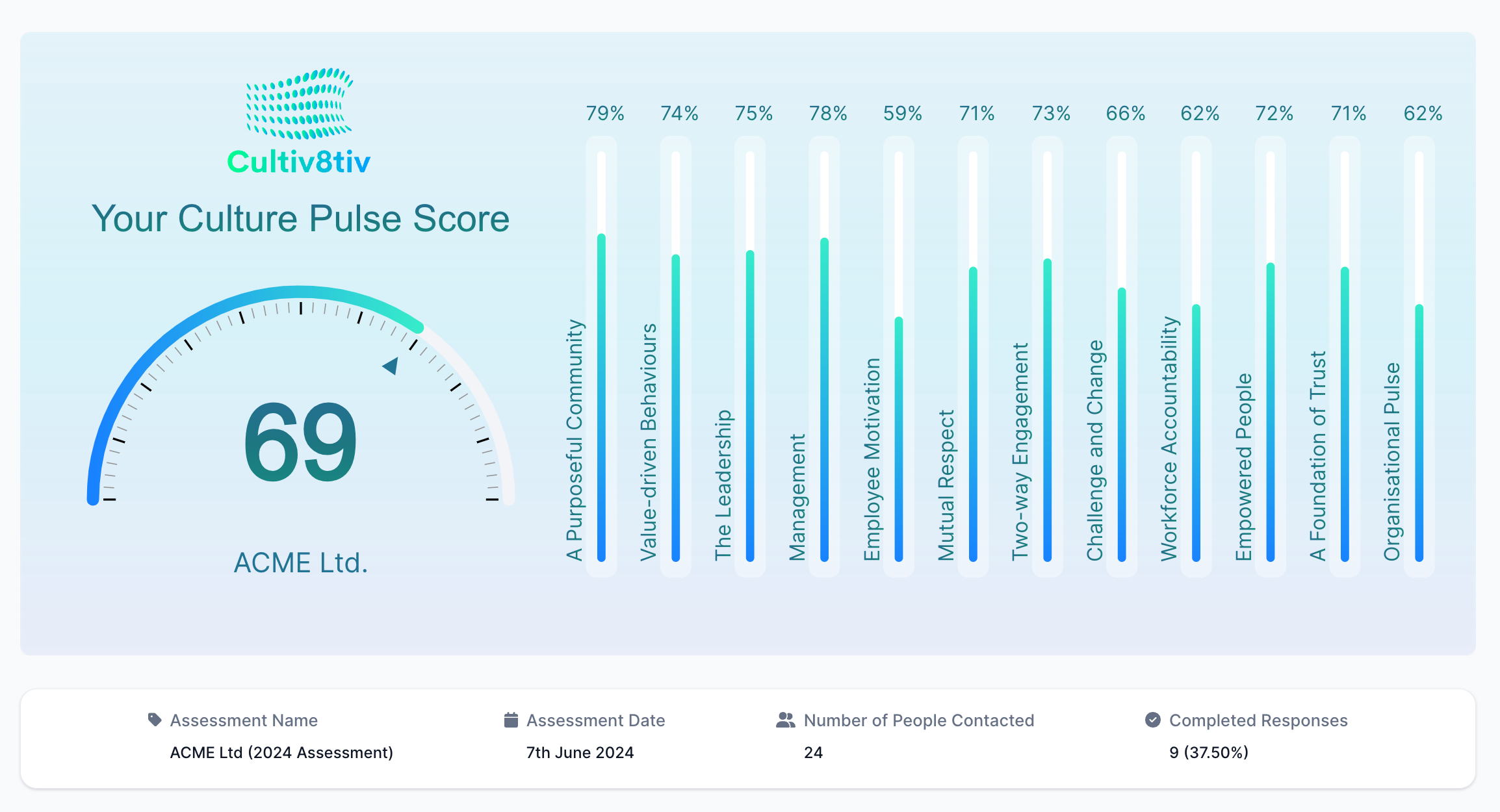Utilise AI to assess organisational culture at scale
Forward thinking CEOs and leadership teams understand that a strong and healthy culture will increase productivity, improve financial performance, reduce absenteeism, improve staff retention and create a more resilient organisation, whilst a poor culture will always hold an organisation back from achieving its potential.
-modified%20(1).png)
We help CEOs and senior leaders understand the culture they have, so they can build the culture they want
Through anonymous assessment and AI we quantify the strength of an organisation's culture, enable benchmarking and provide analysis and insights across 12 key areas.
Our culture assessments take 30 minutes to setup and launch, with employees needing even less than this time to complete. Our AI module enables insight, analysis and actionable recommendations at scale - offering a level of direct employee engagement usually reserved for costly employee interviews.
.png?width=1920&height=1080&name=Untitled%20design%20(1).png)
We assess organisational culture across 12 key areas
A Purposeful Community
For organisations to deliver strong commercial outcomes and fulfil their purpose, creating a supportive work community is imperative. A supportive workplace community enhances employee well-being, reduces anxiety and enables everyone to flourish, whilst purpose gives a shared ambition to aim for and an added meaning to employee work, giving greater connection and advocacy to the organisation.
This area of the assessment asks questions such as:
- What do you feel are the current barriers to achieving a greater sense of community within the organisation?
- On a scale of 1-10 how connected are you personally to the organisation's purpose?
Value-Driven Behaviours
Values and behaviours, be they written or unwritten, are a key component of a healthy workplace culture, because they clarify how the organisation and its people should interact. The behaviours and expectations that an organisation believes are important create the right environment for their workforce, enabling everyone - including the business itself - to achieve their goals and ambitions.
This area of the assessment asks questions such as:
- To what extent are you clear about what the organisation’s values or defined behaviours actually mean?
- What are the current behaviours demonstrated by Management that contribute towards a negative working environment?
The Leadership
Leadership is about guiding and impacting outcomes, enabling groups of people to work together to accomplish what they couldn’t do working individually. The Leaders/ Leadership (i.e. those in ‘leadership’ positions) set direction and use both their actions and words to inspire trust and energy throughout the organisation.
This area of the assessment asks questions such as:
- On a scale of 1-10, to what extent do you respect The Leadership?
- What honest feedback would you like to share with The Leadership?
Management
Managers guide and impact outcomes within their areas of responsibility. They set direction and use both their actions and words to inspire trust and energy within their teams. The role of Management is integral to building a strong organisational culture that includes role-modelling the values and/or behaviours of the organisation.
This area of the assessment asks questions such as:
- On a scale of 1-10 to what extent do Management contribute towards creating the best environment to enable you to do your best work?
- On a scale of 1-10 how much do you think your Manager cares about you? Please explain your answer…
Employee Motivation
Motivation refers to how driven and happy an employee is in their role and in their organisation. If an employee is motivated, they will have a sense of autonomy, mastery and purpose over what and how they perform their role, and are more likely to do a good job and show commitment towards the organisation.
This area of the assessment asks questions such as:
- How realistic are the expectations placed on you by the organisation? Please explain your answer…
- How often do you receive any praise or recognition for your efforts and achievements?

Mutual Respect
Respect or rather mutual respect is a foundational element for building a positive and healthy organisational culture. It not only contributes towards the well-being of employees but also enhances collaboration, two-way communication, and overall organisational effectiveness.
This area of the assessment asks questions such as:
- How often do you hear a Manager or member of The Leadership Team complain publicly about an employee?
- On a scale of 1-10 to what extent do you feel that Management are courteous and considerate to you and other employees?

Two-way Engagement
Two-way engagement encourages open communication between Employees, Management and The Leadership. It creates a platform for sharing ideas, concerns and acts as a feedback loop, fostering a transparent and honest communication channel. This includes clarity of communication from across all parts of the organisation and the extent that employees actively listen to one another.
This area of the assessment asks questions such as:
- When a Colleague, Manager or member of The Leadership ask you to do something, how often do they provide the context and explain why it is important?
- What changes would you like to see that could improve two-way engagement within the organisation?
Challenge & Change
Organisations are always changing and responding to external and internal factors. It is extremely important to ensure that the right conditions exist within the organisation so positive response and change can come from anywhere in the organisation; this change can then be tested, challenged and embraced by both leaders and employees.
This area of the assessment asks questions such as:
- On a scale of 1-10 how comfortable are you at accepting change in the organisation?
- On a scale of 1-10 how comfortable are you challenging a Manager's ideas or presenting them with an alternative viewpoint?
Workforce Accountability
Accountability in the workplace ensures all employees at all levels of the organisation are answerable for their actions, behaviours, and performance. By taking greater accountability of their work employees contribute towards others having a stronger sense of commitment to each other and the organisation.
This area of the assessment asks questions such as:
- On a scale of 1-10 how much can you rely on your colleagues and coworkers to deliver what they promise?
- How comfortable do you feel that the following groups are at admitting they made a mistake?

Empowered People
Empowerment enables employees to take ownership of their work and contribute to meaningful decision-making. An empowered workforce is proven to be associated with better job performance, higher employee satisfaction, and a stronger sense of commitment to the organisation (when given the right resources to do their role).
This area of the assessment asks questions such as:
- How much clarity do you have around what is expected of you in your role?
- What changes could be made that would enable you to achieve more in your role?

A Foundation of Trust
Trust is the foundation of a meaningful relationship between individuals throughout any organisation and is a key element that contributes towards psychological safety, effective communication, employee commitment and productivity. It leads to stronger working relationships, a healthier organisational culture and delivers better outcomes for both employees and clients.
This area of the assessment asks questions such as:
- To what extent do you believe that the organisation acts consistently and dependably in your best interests?
- If you provide some personal information in confidence to your Manager or a Coworker then what is the likelihood that it will be shared with others?
Organisational Pulse
The mood of an organisation is an important barometer, it summarises how people feel in the role they are performing and in the organisation in which they work. It is influenced by all the component parts of an organisation’s culture and shows the impact that these have on the individual employee as well as customer outcomes and experiences.
This area of the assessment asks questions such as:
- What are the three things you would like the organisation to do to make it a better place to work?
- On a scale of 1-10 how much do you feel valued by the organisation?
.png?width=600&height=600&name=Untitled%20design%20(3).png)
Understand the role of AI in our culture assessment tool
- Our AI module computes the organisation’s Culture Pulse Score, a breakdown across 12 categories and builds a comprehensive report for the organisation.
- It calculates and evaluates statistics for the numeric and multiple-choice questions and annotates these findings to provide a deeper understanding behind the numbers.
- We provide a narrative on the overall scoring, insights into the key areas, and identify opportunities to improve.
- Our AI compiles summaries for free-text questions, ensuring that qualitative feedback is accurately reflected in the narrative.
- Our AI module ensures consistency and accuracy in reporting, reducing the risk of human error and bias. The module can process large volumes of data quickly, providing timely insights that would be impractical to achieve manually. Additionally, the AI module's ability to identify patterns and trends across different data points offers a depth of analysis that manual efforts might overlook.
Want to know more?
Speak to one of the team...
If you want to know more, have questions about how it works or want to know how it could benefit your organisation then why not book a 30 minute call with one of the team using the calendar here ➡️ ➡️ ➡️ ➡️

